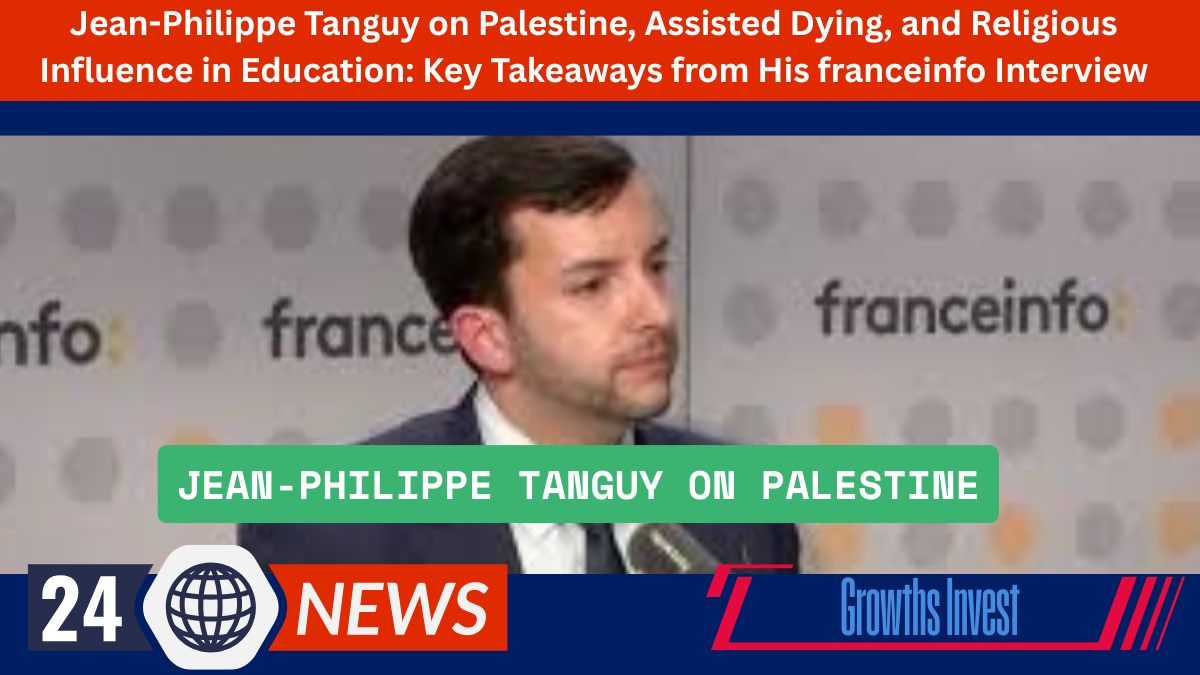Jean-Philippe Tanguy, Member of Parliament for the National Rally (RN) representing the 4th constituency of the Somme, appeared as the guest of the “8:30 franceinfo” program on Friday, May 23. He addressed a series of hot-button issues including France’s potential recognition of a Palestinian state, legislation on assisted dying, and concerns over the influence of the Muslim Brotherhood in French education. Interviewed by Hadrien Bect and Bérangère Bonte, Tanguy offered candid and often controversial views.
“Recognizing Palestine Now Would Be Giving Hamas a Blank Check”
As France prepares to co-host an international summit from June 17 to 20—alongside Saudi Arabia—to reignite the long-dormant peace process based on a two-state solution, the possibility of officially recognizing a Palestinian state has ignited political debate.
For Jean-Philippe Tanguy, the move would be premature and dangerous. “Recognizing a Palestinian state now would be like handing a blank check to Hamas,” he declared bluntly. “Sadly, there is no functional government that could form a legitimate state in the current Palestinian territories, especially in Gaza, which is entirely under the brutal rule of Hamas.”
He argued that the situation in the West Bank is equally concerning. “The traditional authority, the Fatah party, has been significantly weakened. Before any recognition can happen, we need to empower peaceful, legitimate, and non-Islamist authorities like Fatah or other parties that can truly represent the Palestinian people,” he said.
On Gaza: “It’s Not Israel That’s Starving the Civilians”
When questioned about the humanitarian crisis in Gaza, Tanguy defended Israel’s actions, stating that accusations of deliberate starvation by the Israeli government have not been proven.
“There is no evidence that Israel is intentionally starving civilians,” he said. Instead, he pointed the finger at Hamas, claiming the group is diverting humanitarian aid intended for civilians. “The reality is, it’s Hamas that’s starving its own people by hijacking the aid meant for them,” he added.
He did acknowledge, however, that the international community, particularly the United States, could play a greater role in ensuring aid reaches the people who need it most. “There should be monitoring to make sure humanitarian aid actually benefits civilians and not terrorist organizations.”
Tanguy concluded this segment of the interview with a call for accountability: “There will be investigations, historians, and legal experts who will eventually evaluate these events. If Israel has committed any wrongdoing, it will have to answer for it. But let’s not forget where the real blame lies today.”
Assisted Dying Bill: “I Will Vote for It”
Breaking ranks with his party’s leadership, Jean-Philippe Tanguy revealed he intends to vote in favor of the controversial assisted dying legislation currently under review in the National Assembly.
“I will vote for this bill, along with a few of my colleagues,” he said, despite the official stance of RN leaders Marine Le Pen and Jordan Bardella, who oppose the bill, citing insufficient safeguards for the vulnerable.
Tanguy emphasized that National Rally MPs are free to vote according to their conscience on this issue. “We have complete freedom of vote within our group,” he explained. “As long as the final version of the bill maintains strict safeguards, I will support it.”
Marine Le Pen, for her part, has said that even with amendments, the current draft does not offer enough protection against potential abuses, and she will not vote for it. Tanguy, however, downplayed any suggestion of internal party conflict, describing the differing views as a sign of healthy debate within the RN.
“This doesn’t harm our unity. On the contrary, it shows that the National Rally can facilitate serious, mature discussions on critical social issues,” he said. A final vote on the bill is scheduled for Tuesday, following the weekend’s deliberations.
Muslim Brotherhood Report: “Religious Networks Thrive—And It’s Not About Arabic Lessons”
Tanguy also responded strongly to a recent government report on the growing influence of the Muslim Brotherhood in France, which recommended expanding Arabic language education in public schools as a strategy to prevent young people from turning to religious schools that may promote extremist ideologies.
He dismissed the premise outright. “That’s complete nonsense,” he said. “I fully support teaching Arabic in public schools—it’s part of a great and rich civilization.”
In a personal anecdote, Tanguy shared that he studied Arabic himself at the prestigious Henri IV high school in Paris. “I learned Arabic at Henri IV,” he said proudly, “and that never made me vulnerable to radicalization.”
He argued that language is not the issue. “The reality is that religious networks are thriving in certain areas, and that has nothing to do with teaching Arabic in school,” he stated. Drawing a sharp analogy, he added, “Would anyone suggest that Maoism spreads because we teach Chinese?”
Tanguy’s comments underscore the broader concerns within the RN regarding Islamist influence in France, though his support for Arabic instruction sets him apart from some of the party’s more hardline voices.
From international diplomacy to life-and-death domestic legislation, Jean-Philippe Tanguy’s interview on franceinfo reveals a politician unafraid to break with his party line—so long as it serves his principles. Whether he’s voicing caution over Palestinian statehood, defending Israel’s military policies, or backing assisted dying rights, Tanguy’s stances reflect a blend of ideological conservatism and pragmatic independence.
As France approaches pivotal decisions on the international stage and in its own National Assembly, voices like Tanguy’s are sure to shape both the debate and its outcomes.

